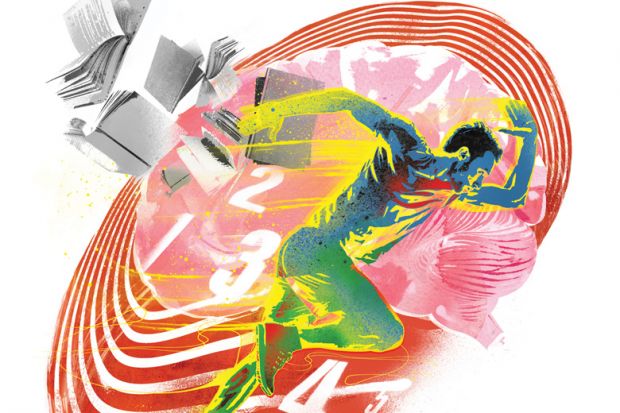Who would dare incur the wrath of a rower or the fury of a fencer? Only the foolish go where angels fear to tread, arranging adviser meetings on Wednesday afternoons.
The custom of keeping that mid-week slot sacred to student sports is one of those quirks of British university life: its origins mystifying, its directive absolute. And if you’ve ever queried how many students actually devote themselves to sporting endeavour, a cursory amble around the website of British Universities & Colleges Sport reveals an impressive array of activities on offer, from clay pigeon shooting and korfball to wakeboarding and wheelchair basketball. The organisation professes “to enhance the student experience through sport”, with leagues comprising more than 4,800 teams and 100 championship events every year.
You need not be sporting, of course, to find the Olympics irresistible. I have yet to meet an opening ceremony that didn’t moisten my eye, but then I confess to being the sentimental sort, easily swayed by notions of collective endeavour and global goodwill. I know one ought to be more sceptical, and I diligently devoured the usual spate of articles issued in the run-up to the games exposing corrupt officials, doping scandals and disastrous Olympic “regeneration” projects of previous games (frequently illustrated with images of mildewed swimming pools decaying with all the charm of a Chernobyl). And yet, I still find myself awake at 1am, agog at the qualifying round of the women’s individual foil fencing.
In 2012, the London Olympics unfurled on my doorstep. Garish pink ringed flags festooned my street, and my East End university revelled in its relative proximity to the Queen Elizabeth II Park, where most of the Olympic venues were located. In those joyful few weeks, it seemed impossible to stroll into Stratford for a sandwich without bumping into Bermudan basketballers, and it felt quite ordinary to find entire volleyball teams, all bare, bronzed torsos, heading into town on the Central Line. That brilliant summer seems like such a long time ago given the post-referendum blues of our current one.
The original Olympic Games were, of course, concerned with intellectual and artistic endeavours, too. The Pan-Hellenic Games of Ancient Greece, dedicated to Zeus, date back to 776BC. Olympia, the site of the games, housed one of Greece’s largest Doric temples, which contained one of the seven wonders of the ancient world: a 42-foot high statue of Zeus, forged in gold and ivory. Sculptors, poets and artisans attended the games alongside the athletes, composing paeans to the most distinguished competitors and displaying works of art. Perhaps the most famous is Myron’s Discobolus, a long-lost bronze statue whose numerous Roman reproductions depict an athlete tightly wound like a coil, crouched and twisted, one arm stretched across him and the other behind him clasping a discus, ready to be swung round and released. The art historian Kenneth Clark famously enthused over its “sheer intelligence”, finding in it the perfect balance, proportion and harmony of the athletic body realised in art.
And it is this idea that mind and body, intellect and athleticism need not be uncoupled that intrigues me as my students disappear at Wednesday lunchtime. In philosophy, we continue to wrestle with Cartesian dualism, worrying over how far mind and body can be understood separately. Yet there is an irony here, too, in the way that the broader academic profession seems so peculiarly tilted in one direction: so often tending towards the sedentary, so immersed in brain work that it sometimes feels as though our abstract brilliance barely needs our bodies at all.
But some of us, with our telltale squash rackets poking out of our bags and our yoga mats rolled up in the corner of our offices, know different. We know the kind of knowledge that the sporting body itself yields. The runners among us know that sometimes we run to think, as though we might jolt our brains into going at a problem differently. And there is already an understanding between the brain and our beating feet: the rapid relaying back and forth of nervous information and data registering space and balance that keeps us in continuous motion.
We also run in search of respite from our otherwise cerebral lives, of course, as though we believed that in running we could leave thought behind, and that we might find in our feet, so far from our brains, some kind of relief. Yet when we are distressed we are accustomed to saying we “pace with worry”; when we waste no time, we “hit the ground running” or are “quick off the mark”. Most tellingly, when we are alert, responsive to an unanticipated situation, we “think on our feet”, seeing in physical agility a true likeness to mental rapidity.
Remembering this sympathy of body and brain is perhaps the profit we derive from putting down our books during an Olympic summer and admiring, instead, those athletes striving like gods and goddesses. We are so often carried away by the life of the mind, why not be swept off our feet instead by the body at its best?
Shahidha Bari is lecturer in Romanticism at Queen Mary University of London.
POSTSCRIPT:
Print headline: Sing the body electric
Register to continue
Why register?
- Registration is free and only takes a moment
- Once registered, you can read 3 articles a month
- Sign up for our newsletter
Subscribe
Or subscribe for unlimited access to:
- Unlimited access to news, views, insights & reviews
- Digital editions
- Digital access to THE’s university and college rankings analysis
Already registered or a current subscriber?




